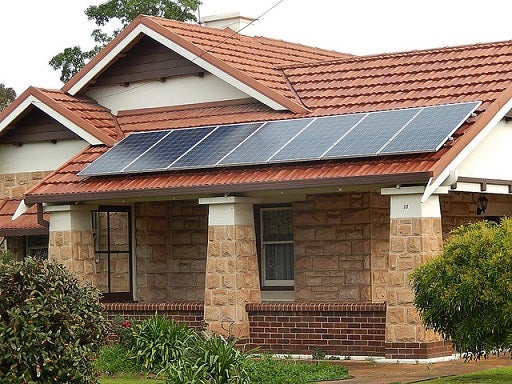
PACE financing allows home owners to install solar panels and repay the loans through their property tax bill. Photo source: Michael Coghlan Flickr.
Last week saw the completion of two exciting finance transactions that will increase investment in and reduce costs for clean energy projects.
In the first transaction, Renovate America, announced that it raised $50 million in venture capital funds to expand operations. The San Diego-based company develops residential Property Assessed Clean Energy (PACE) programs, which allow home owners to repay loans for energy efficiency and/or renewable generation through their property tax bill. Renovate America runs the successful HERO program, which in its first two years of operation provided $130 million in financing to homeowners in western Riverside County to retrofit their homes and reduce electricity bills.
So far this year, Renovate America has invested an additional $120 million to fund retrofits across California. EDF hopes the recently announced $50 million capital injection will not only allow Renovate America to continue its California expansion, but to expand to other states in the near future as well. We plan to work closely with Renovate America and their primary competitor Renewable Funding, which closed its venture round in April by raising $20 million. EDF’s collaboration with both companies will help additional states create residential PACE programs, attract investment for homeowners, and create jobs.
As we discussed in March, securitized PACE financing is very attractive to institutional investors, who we expect will provide plenty of low-cost capital to fund the expansion of such programs.
The second transaction is the initial public offering (IPO) of TerraForm Power, a subsidiary of the solar project developer, SunEdison. TerraForm will invest in existing solar projects that are already in operation. Since TerraForm does not take on any development risk and the projects are already underway when it invests, TerraForm has a substantially lower cost of capital than its parent company, SunEdison. TerraForm plans to distribute most of its profits in dividends and has attracted significant interest from retail investors.
The IPO priced last week at $25 per share and is now trading at $33. TerraForm follows successful IPOs for companies with similar business models, such as: Nextera Energy Resources, which priced at $25 on July 2nd and is now trading at $34.50, as well as NRG Yield, which priced last July at $22 and has more than doubled in price to $51. TerraForm, however, is the first among the three planning to invest in residential projects.
Collectively, these companies are known as ‘yieldcos’, which are created for the express purpose of owning assets that produce cash flow to distribute as dividends to shareholders. Yieldcos are expected to drive down the cost of capital for renewable energy projects. Since most of these projects are financed for more than 20 years, lower financing costs will have a significant impact on the cost of clean energy.
New financing strategies are being combined with better, cheaper technologies, innovative public policies, and new business models to lower the cost of capital. Together, these innovations are beginning to make clean energy available to more Americans at a lower cost than fossil fuel solutions.









